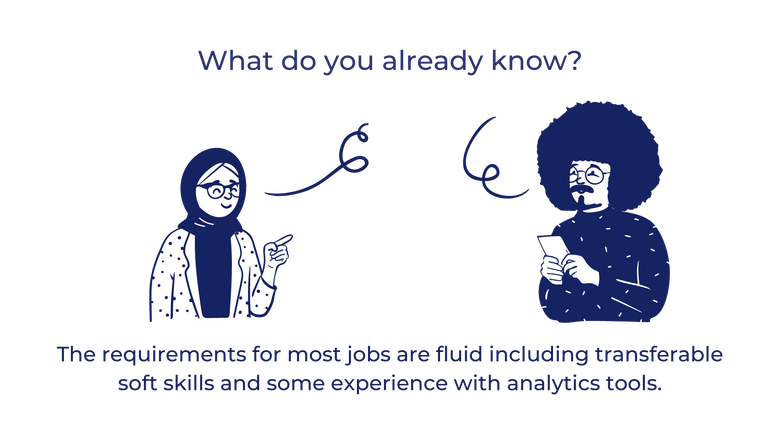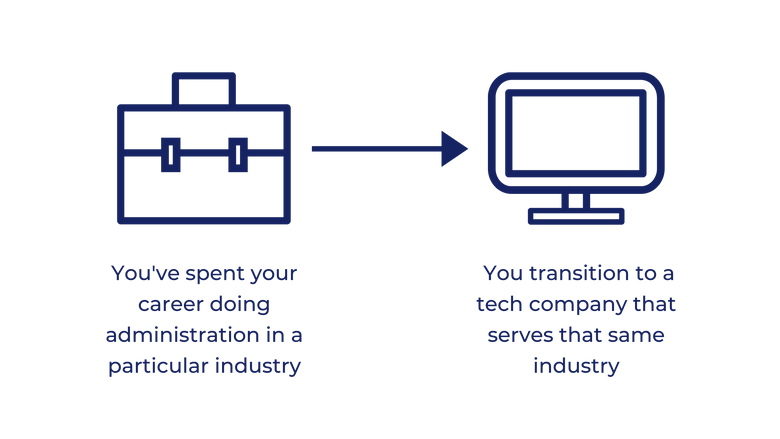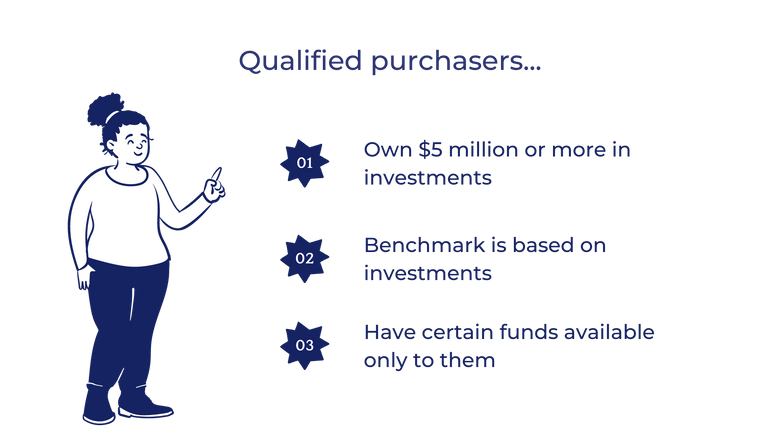How to Land a Tech Job With a Non-Technical Background
Looking to join the tech industry but have a non-technical background? You may be a fit for certain tech roles with the skills you already have.
Tech jobs come with enviable perks: flexible work schedules, an above-average starting salary (plus stock options), and formal opportunities for career development and mentorship. Tech workers also have the opportunity to work on emerging technologies that change the way we live, work, and play. These perks, however, aren’t limited to programmers, UX designers, and data scientists.
Due to a shortage of tech talent, companies are increasingly turning to candidates with non-technical degrees to fill vacant positions. In 2018, nearly 2.4 million STEM jobs went unfilled. More than half of the companies on the CNBC Technology Executive Council said it has become more difficult to fill open tech positions compared to a year ago, while fewer than 10% say it’s gotten easier. What’s more, some tech companies are actively seeking liberal arts majors because of their interpersonal skills and industry knowledge.
Infosys, a global IT consultant, is partnering with liberal arts colleges like Trinity College to train the workforce of the future. Liberal arts education is often thought of as a T-model representing breadth and depth of knowledge. Because students gain such a broad education, they learn to connect disparate ideas threaded through many subjects and understand different points of view. Tech workers regularly collaborate with cross-functional teams, which requires a similar set of skills.
Case in point: a senior software engineer must be able to reconcile business requirements with user expectations, collaborate with product teams, and mentor junior engineers. By investing in people with liberal arts degrees, companies hope to gain people with human-centered skills who can approach problems in entirely new ways. They bring a breadth of knowledge from across humanities and social sciences that complement the hard skills of engineers and data scientists.
Here’s a quick guide on how to identify your transferable skills, what types of tech roles are suited to non-technical talent, and how to position your background as an asset.
1. Take Stock of What Skills You Already Have

Outside of core product development and engineering teams, tech companies need to fill a variety of non-technical roles, such as HR, accounting, media relations, marketing sales, and customer service. Experience in any of these areas, even outside of the tech industry, comes in handy. Or maybe you want a more product-focused role where you’ll work directly with customers or product development teams.
Think of it this way: the requirements for most jobs are fluid—even if the job description seems unrealistically specific—with the exception of highly skilled roles like data science, cybersecurity, and software engineering, which require specialized training in programming languages, databases, and computer systems.
Transferable skills like research, study design, project management, presentation skills, and writing skills are invaluable to the tech industry. In fact, you may have even picked up data analytics skills in a previous role, even if working with data wasn’t your main focus. As businesses increasingly rely on big data to make decisions, many non-technical jobs such as digital marketing, sales management, and revenue operations require some data analysis skills and experience with Excel, Tableau, and other analytics tools.
2. Consider Which Tech Roles You’re Already Qualified For

Most client-facing roles in tech require candidates with leadership skills and analytical abilities, meaning they are able to understand client requirements and proactively address their needs. A technical background might be helpful, but if you work for a SaaS business, you’re likely to receive on-the-job training on how to use the company’s proprietary software. Familiarity with similar tools is helpful, but not essential.
In fact, soft skills like organization, communication, problem-solving, project management, work ethic, and entrepreneurialism are universally sought, regardless of the industry.
Here are a few examples of client-facing roles in tech that are suited to people with non-technical backgrounds.
Customer Success Manager
What Does a Customer Success Manager Do?
CSMs work with clients to ensure they gain the most benefit from their software subscription and technical support. Their job is to help customers achieve their goals using the software and preserve customer loyalty.
Backgrounds That Make You a Good Fit
These backgrounds may make you a good fit: account management, customer service, client services, management consulting, and sales.
Technical Skills You May Already Have
- CRM systems
- Sales management software
- Experience with industry-specific software, such as healthcare or finance software
- MS Office and Google Workspace (formerly G Suite)
- Sales enablement (eg: user documentation, pitch decks)
Soft Skills You May Already Have
- Strong writing and communication skills
- Empathy
- Organization skills
- Relationship-building
- Problem-solving and analytical skills
Implementation Specialist
What Does an Implementation Specialist Do?
Implementation specialists ensure that software systems meet clients’ technical and business requirements. Their job is to customize the software, install customized software solutions, and integrate the software with the client’s existing technology stack.
Implementation specialists may also conduct training sessions with clients to teach them how to use the software.
Backgrounds That Make You a Good Fit
These backgrounds may make you a good fit: customer service, account management, project management, team lead, and data analysis.
Technical Skills You May Already Have
- SQL database management systems
- Excel
- Microsoft Office
- Project management tools
- Teaching or training others
Soft Skills You May Already Have
- Ability to explain complex technical concepts in plain language
- Strong writing and communication skills
- Patience
- Empathy
Product Marketer
What Does a Product Marketer Do?
Product marketers create a go-to-market strategy to help launch a new product, such as positioning the product and deciding how and where to retail it. After the product launches, product marketers are responsible for making sure customers are aware of the product, know how to use it, and that their feedback is being incorporated throughout the product’s lifecycle.
Backgrounds That Make You a Good Fit
These backgrounds may make you a good fit: branding and marketing, business development, product distribution, UX design, and user acquisition.
Technical Skills You May Already Have
- User research
- Branding strategy
- Marketing and advertising campaigns
- Copywriting
- User journey mapping
Soft Skills You May Already Have
- Strong writing and communication skills
- Collaborating with cross-functional teams (Eg: product, sales, and customer support)
- Storytelling and interviewing
UX Researcher
What Does a UX Researcher Do?
UX researchers unearth insights from current and prospective end-users to better understand how to apply design principles to a product or solution that meets their needs. They interview customers, create user personas, design customer journeys and gather feedback.
Backgrounds That Make You a Good Fit
These backgrounds may make you a good fit: psychology, behavioral economics, anthropology, sociology, and cognitive science.
Technical Skills You May Already Have
- Study design
- Interviewing
- User journeys and user flows
- Qualitative and quantitative research
- Data visualization
Soft Skills You May Already Have
- Strong writing and communication skills
- Collaborating with cross-functional teams
3. Bring Domain Knowledge From Another Industry

While some general-purpose SaaS businesses (like CRM and ERP providers) serve a range of industries, other tech companies design and implement software solutions for niche sectors. Companies do this to help solve industry-specific pain points—such as accounting software to help law firms automate their billing process, or supply chain software to enable grocery stores to minimize food waste.
In order to meet clients’ needs, these Saas businesses need a thorough understanding of the industry’s pain points from the perspective of both employees and customers. This is where your domain knowledge comes in handy—especially for roles like UX research, marketing, and technical writing, where empathy for the user is paramount.
Let’s say you’ve spent your entire career in healthcare administration and you’re looking to transition into tech. You can apply your talents to a tech company that serves the healthcare industry by leveraging your understanding of the types of pain points patients experience during a hospital visit. Or maybe you taught grade school for several years and you have ideas about how to make AI-powered adaptive learning solutions more personalized and academically rigorous.
Take a careful look at the job description, try to find out what types of clients the company serves, or even new industries the company would like to break into, and consider how your domain knowledge can be an asset to the business. You’d be surprised how much you already know.
4. Connect the Dots

Now it’s time to make the connection for the hiring manager—how do your transferable skills and domain knowledge align with the company’s needs?
Reference problems you solved in the past and connect them to the pain points the company’s clients are facing. When summarizing each role in your resume, tailor your prior job responsibilities to the type of work experience the company is looking for.
For example, if you held administrative roles in the past, emphasize your time management and organization skills, and reference any project management tools you may have used in the past (especially if the company you’re applying to uses them). Perhaps you read in a press release that the company is launching a new software feature for property managers and you have years of experience as a building superintendent—explain how your thorough understanding of the pain points of this new client base will enable you to craft a marketing strategy that resonates with them. Take it one step further and propose one or two ideas right then and there for how you’ll accomplish this.
Reiterate these points over and over throughout your cover letter and during the interview process. Remember, most hiring managers consider it a safer bet to hire candidates with a linear work history and years of experience in the industry; taking on someone from a different background requires a considerable risk tolerance.
Therefore, the onus is on you to make the connection for the hiring manager as to why you are uniquely suited to the position given that you bring a boots-on-the-ground perspective from another industry.
The information provided herein is for general informational purposes only and is not intended to provide tax, legal, or investment advice and should not be construed as an offer to sell, a solicitation of an offer to buy, or a recommendation of any security by Candor, its employees and affiliates, or any third-party. Any expressions of opinion or assumptions are for illustrative purposes only and are subject to change without notice. Past performance is not a guarantee of future results and the opinions presented herein should not be viewed as an indicator of future performance. Investing in securities involves risk. Loss of principal is possible.
Third-party data has been obtained from sources we believe to be reliable; however, its accuracy, completeness, or reliability cannot be guaranteed. Candor does not receive compensation to promote or discuss any particular Company; however, Candor, its employees and affiliates, and/or its clients may hold positions in securities of the Companies discussed.
